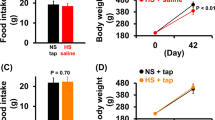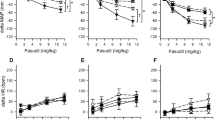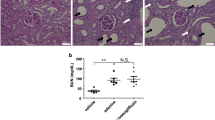Abstract
The objective of our study was to evaluate the role of the baroreflex control of peripheral sympathetic nervous system on the increase of muscle sympathetic nerve activity (MSNA) in salt-sensitive (SS) and salt-resistant (SR) hypertensives under low salt diet. In phase I mild-to-moderate hypertensive patients (n=5) received three diet periods: a first regular salt (RS1), a low salt (LS=20 meq Na+/day), followed by a second regular salt diet (RS2) with a 7-day duration of each. At the end of each period, sympathetic and heart rate baroreflex control were recorded. Baseline MSNA varied (P<0.005) from 18±8 (RS1) to 32±9 (LS) and to 14±9 (RS2) bursts per minute (bpm). In phase II additional patients (n=6) were included to have baseline MSNA, sympathetic and heart rate baroreflex control evaluated at the end of the LS and RS2. For all patients (n=11), there was a significant decrease of MSNA from 36±4 to 20±8 bpm on day 7 of LS to RS2 (P<0.05). The response of MSNA to a salt restriction was similar for SS and SR patients, who showed a change from 32±6 to 18±11 and from 36±9 to 17±7 bpm for SS and SR on day 7 of LS and RS2 diets, respectively (P<0.05). MSNA baroreflex gain was similar during phenylephrine infusions at day 7 of LS and RS2 (5.1±1.6 and 6.1±2.9 bpm/mmHg), but it was reduced under LS during sodium nitroprusside infusion (19.5±4.9 vs 8.9±0.7 bpm/mmHg) (P<0.05) for the whole group. Baroreflex control of MSNA was also similar during phenylephrine infusions under LS and RS2 diets for SS (4.0±0.9 and 3.3±0.2 bpm/mmHg) and for SR patients (10.1±2.5 and 5.6±1.5 bpm/mmHg). During nitroprusside infusion, baroreflex gain was significantly greater under RS2 for SR patients (19.5±2.6 bpm/mmHg) when compared to LS (11.2±5.2 bpm/mmHg) and the same significant difference was observed among SS patients (14.4±4.7 and 9.1±3.6 bpm/mmHg under RS2 and LS diets, respectively). There was no difference in heart rate baroreflex gain between LS and RS2 diets. Data support the hypotheses that (1) sodium supresses baseline MSNA in SS and SR hypertensives and (2) sodium restriction may impair baroreflex control of MSNA in SR and SS mild-to-moderate hypertensive patients during blood pressure reductions.
This is a preview of subscription content, access via your institution
Access options
Subscribe to this journal
Receive 12 digital issues and online access to articles
$119.00 per year
only $9.92 per issue
Buy this article
- Purchase on Springer Link
- Instant access to full article PDF
Prices may be subject to local taxes which are calculated during checkout


Similar content being viewed by others
References
Anderson EA, Sinkey CA, Lowton WJ, Mark AL . Elevated sympathetic nerve activity in bordeline hypertensive humans. Evidence from direct intraneuralrecordings Hypertension 1989 14: 117–183
Grassi G et al. Baroreflex impairment by low sodium diet in mild or moderate essential hypertension Hypertension 1997 29: 802–807
Campese VM et al. Abnormal relationship between sodium intake and plasma norepinephrine in patients with essential hypertension Kidney Int 1982 21: 371–378
Joint National Committee. The 1988 report of the Joint National Committee on detection, evaluation and treatment of high blood pressure Arch Intern Med 1988 148: 1023–1038
Devereux RB, Reichek N . Echocardiographic determination of the left ventricular mass in man. Anatomic validation of the method Circulation 1977 55: 613–618
Valbo AB et al. Somatosensory propioceptive and sympathetic activity in human peripheral nerves Physiol Ver 1979 59: 919–957
Rea RF, Hamdan M . Baroreceptor control of muscle sympathetic nerve activity in borderline hypertension Circulation 1990 82: 856–862
Grassi G et al. Sympathetic activation in obese normo-tensive subjects Hypertension 1995 25: (Part I) 560–563
Meyrelles SS, Tinucci T, Hollanda HEM, Mion Jr D . Baroreflex control of muscle sympathetic nerve activity in mild to moderate hypertension Am J Hypertens 1997 10: 162–167
Takeshita S, Ferrario CM . Altered neural control of cardiovascular function in sodium-depleted dogs Hypertension 1982 4: (Suppl II) II-175–II-182
Sullivan JM, Ratts TE . Salt suppresses baseline muscle sympathetic nerve activity in salt-sensetive and salt-resistant hypertensives Hypertension 1988 11: 717–723
Dahl LK, Heine M, Tassinari L . Effects of chronic excess salt ingestion. Evidence that genetic factors play an important role in susceptibility to experimental hypertension J Exp Med 1962 115: 1173–1190
INTERSALT Cooperative Research Group. Intersalt: an international study of electrolyte excretion and blood pressure. Results for 24-hour urinary sodium and potassium excretion BMJ 1988 297: 319–328
Ferrari A, Mark AL . Sensitization of aortic baroreceptors by high salt diet in Dahl salt-resistant rats Hypertension 1987 10: 55–60
Ferrari AV, Gordon FJ, Mark AL . Impairment of cardiopulmonary bororeflexes in Dahl salt-sensitive rats fed low salt Amr J Physiol 1984 247: H119–H123
Gordon FJ, Matsuguchi H, Mark AL . Abnormal baro-reflex control of heart rate in prehypertensive and hypertensive Dahl genetically salt sensitive rats Hypertension 1981 3: (Suppl 1) I-135–I-141
Munakata M et al. Increased gain in baroreceptor-heart rate reflex in patients with primary aldosteronism J Hypertens 1995 13: 1648
Author information
Authors and Affiliations
Corresponding author
Rights and permissions
About this article
Cite this article
Abrahão, S., Tinucci, T., Santello, J. et al. Salt supresses baseline muscle sympathetic nerve activity in salt-sensitive and salt-resistant hypertensives. J Hum Hypertens 16, 843–850 (2002). https://doi.org/10.1038/sj.jhh.1001492
Published:
Issue Date:
DOI: https://doi.org/10.1038/sj.jhh.1001492



